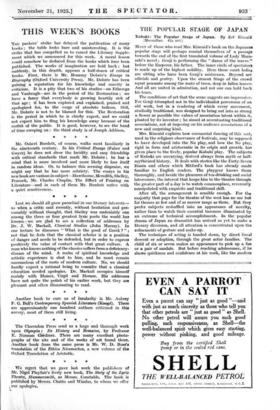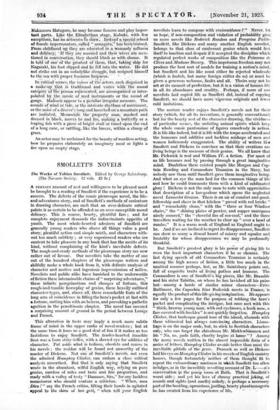THE POPULAR STAGE OF JAPAN
Kabuki: The Popular Stage of Japan. By Zo5 Kincaid (Macmillan. 42s. net.) MANT of those who read Mrs. Irmeaid's book on the Japanese popular stage will perhaps remind themselves of a passage towards the end of the first translated volume, of Lady Mum- saki's novel ; Genji is performing the dance of the waves " before the Emperor, his father. The inner circle of spectators is made up of the highest nobility. Here those court, ladies are sitting who have been Genji's mistresses. Beyond are 'officials and gentry. Upon the utmost fringe of the crowd squat peasants among the roots of trees, deep in fallen leaves- And all are united in admiration, and not one can hold back his tears.
The conditions of art that the scene suggests are impressive. For Genji triumphed not in the individualist perversion of an old work, but in a rendering of which every movement, studiedly traditional, was designed to bring out into as strong a flower as possible the values of association latent within it, planted by its inventor ; he aimed at accentuating traditional associations, not at imposing on his audience associations of a new and surprising kind.
Mrs. Kincaid explains how ceremonial dancing of this sort, used in the religious observance of festivals, may be supposed to have developed into the No play, and how the No play, rigid in form and aristocratic in its origin and growth, has given place to the lively, popular Kabuki play. The subjects of Kabuki are unvarying, derived always from myth or half- mythicized history. It deals with stories like the Forty-Seven Bonin and others which Mitford's book has already made familiar to English readers. The, playgoer knows them thoroughly, and beside the pleasures of tea-drinking and social intercourse, the interest that keeps him to the theatre through the greater part of a day is to watch commonplace, reverently.
manipulated with exquisite and traditional skill. .
After all, the arrangement is sensible enough. For thq majority that pays for the theatre,of the west has no use but for themes as few and of as narrow range as these. But they, prefer subjects reshuffled into an appearance of novelty, rather than to watch their essential bareness illuminated by an extreme of technical accomplishment. In the popular drama of Japan no dramatist has arrived as yet to make a literary diversion, and all attention is concentrated upon the refinements of gesture and make-up.
The technique of acting is handed down, by direct lineal descent or adoption, through the great actor families. The child of six or seven makes an appearance to pick up a fan or a pair of sandals. But before reaching adolescence, if he shows quickness and confidence at his work, like the modern Nakamura Matagoro, he -may -become famous and play impor- tant parts. Like the Elizabethanstage,lcsibtiki, with few saceptions, haslo actresses - Instead a special school of female impersonators, called- " onnagata," has been trained. . . , From childhood nii,they are. edikated in a womanly softness and .delicacy:: 4ftheY are, married and their wives are men- tioned conireiSatiOn, they blush with shame. It Is tOld–'of one Of the greatest orfii6ni,.:tliat; taking ship for Nagasaki, his foot slipped and he fell into the water. He did not strike out in an unladylike ifruggle, but resigned himself to the sea with-Proper feminine In critical scenes, the voices ofthe actOrs,..eachdiskuised in a make-iiplAliat traditional. and Varies with -_the moral category-Or .tlie person represented; are a-CcOrripaiiied -or inter- polated by the_ music of...reed instripients or the sound of gongs, Madmen appear to a` Peeuliiiiiiegidar. measure. The sount4 of wind of tide,- or the intricate rhythms of Merriment, or the noise of a dioi-er's song and horSeb.ell on a Mountain path are -imitated. Meanwhile 'tile: piciperty pan,- masked and dressed in. black, moves to andIrd,' making a butterflya leaping fish with a piece of bright stuff 'or tinsel upon the end of a long cane, or rattling, like the breeze, within a clump of grass.
An actor may be acclaimed for the beauty of wordless acting, how he prepares elaborately an imaginary meal or lights a fire upon an empty stage.















































 Previous page
Previous page